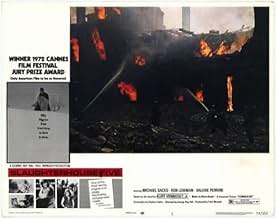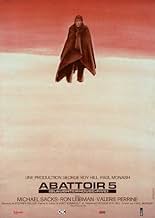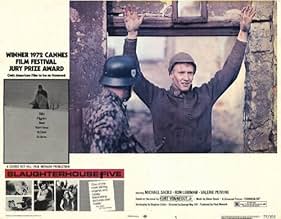CALIFICACIÓN DE IMDb
6.8/10
14 k
TU CALIFICACIÓN
Un hombre llamado Billy Pilgrim cuenta la historia de cómo se liberó a tiempo y fue secuestrado por extraterrestres.Un hombre llamado Billy Pilgrim cuenta la historia de cómo se liberó a tiempo y fue secuestrado por extraterrestres.Un hombre llamado Billy Pilgrim cuenta la historia de cómo se liberó a tiempo y fue secuestrado por extraterrestres.
- Dirección
- Guionistas
- Elenco
- Premios
- 3 premios ganados y 4 nominaciones en total
Friedrich von Ledebur
- German Leader
- (as Friedrich Ledebur)
Ekkehardt Belle
- Young German Guard
- (as Nick Belle)
- Dirección
- Guionistas
- Todo el elenco y el equipo
- Producción, taquilla y más en IMDbPro
Opiniones destacadas
10herbqedi
The realization of this glimpse into the mind's eye of a man unstuck in time is brilliant to behold. Yes, the book is a brilliant work in its own right, and open to interpretation, as a truly complex work must be. The movie is not the book. It is Hill's interpretation of the book, and a brilliant and viable one it is.
Hill won the best Director Oscar the next year with "The Sting". He later filmed the similarly unfilmable "World According To Garp" and also did a brilliant job with it, partially by letting go of John Irving's more depressing side. Other notable credits include Butch Cassidy... and The Great Waldo Pepper.
Michael Sacks, in his first movie, and only starring role at the tender age of 24, is completely convincing and natural. He is equally effective, compelling, and believable at the six distinct stages of Pilgrim's life memorialized herein. If he weren't up to the six-in-one role, the film wouldn't work, but he is, and it does. (I wonder why he has no other major credits, and ceased acting altogether in 1984. If anyone knows, please e-mail me.)
Valerie Perrine is fine as Montana Wildhack. The other characters are all played for maximum irony and effect, and the cast delivers beautifully, without exception. Eugene Roche is the epitome of kindness as Edgar Derby, the yin, to Ron Liebman's yang, a twisted ball of anger named Paul Lazaro. John Dehner is brilliant as a war-hawk professor upset at the Vietnam protesters. His character would be as appropriate amidst today's global conflagration as it was in 1966. Lucille Benson, Kevin Conway, Sorrell Booke, Holly Near, Richard Schaal, and Perry King are the more familiar names in a uniformly excellent cast, including the German actors.
The musical score is also perfect, both in tone and substance. Vonnegut is a master of superimposing satire over irony over futility. The movie does a marvelous job of blending these contrasts and making its audience feel enriched. The music underscores all of these contrasts. The cinematography also is magnificent.
Searching desperately for something to say to show that the movie cannot be 100% perfect, the only thing I can come up with is that the pacing of the movie drags slightly when the soldiers leave the first camp for Dresdner until their new Kommandant gives his "welcoming" speech. It might have played better with about three minutes cut from that sequence. So what?
I recently saw Slaughterhouse Five for the fifth time in 27 years since I originally saw it at my college campus -- this time on DVD. I never fail to catch something new, and I never fail to enjoy it all the more.
Given how many 70's movies have failed miserably to withstand the test of time, Slaughterhouse Five is a true treat to be savored.
Hill won the best Director Oscar the next year with "The Sting". He later filmed the similarly unfilmable "World According To Garp" and also did a brilliant job with it, partially by letting go of John Irving's more depressing side. Other notable credits include Butch Cassidy... and The Great Waldo Pepper.
Michael Sacks, in his first movie, and only starring role at the tender age of 24, is completely convincing and natural. He is equally effective, compelling, and believable at the six distinct stages of Pilgrim's life memorialized herein. If he weren't up to the six-in-one role, the film wouldn't work, but he is, and it does. (I wonder why he has no other major credits, and ceased acting altogether in 1984. If anyone knows, please e-mail me.)
Valerie Perrine is fine as Montana Wildhack. The other characters are all played for maximum irony and effect, and the cast delivers beautifully, without exception. Eugene Roche is the epitome of kindness as Edgar Derby, the yin, to Ron Liebman's yang, a twisted ball of anger named Paul Lazaro. John Dehner is brilliant as a war-hawk professor upset at the Vietnam protesters. His character would be as appropriate amidst today's global conflagration as it was in 1966. Lucille Benson, Kevin Conway, Sorrell Booke, Holly Near, Richard Schaal, and Perry King are the more familiar names in a uniformly excellent cast, including the German actors.
The musical score is also perfect, both in tone and substance. Vonnegut is a master of superimposing satire over irony over futility. The movie does a marvelous job of blending these contrasts and making its audience feel enriched. The music underscores all of these contrasts. The cinematography also is magnificent.
Searching desperately for something to say to show that the movie cannot be 100% perfect, the only thing I can come up with is that the pacing of the movie drags slightly when the soldiers leave the first camp for Dresdner until their new Kommandant gives his "welcoming" speech. It might have played better with about three minutes cut from that sequence. So what?
I recently saw Slaughterhouse Five for the fifth time in 27 years since I originally saw it at my college campus -- this time on DVD. I never fail to catch something new, and I never fail to enjoy it all the more.
Given how many 70's movies have failed miserably to withstand the test of time, Slaughterhouse Five is a true treat to be savored.
The film Slaughterhouse 5 is a brilliantly portrayed interpretation of a great but typically multilinear novel by science fiction author Kurt Vonnegut. With all due respect to the literary critics, sci fi really is what Vonnegut most often wrote - whether or not it is viewed as allegory or even 'serious literature'. As such, it was not really made to convey the same messages,nor even the aesthetics of the book, but rather to convey the director's (and others on the creative team) impressions of the book.
The book is also brilliant, but none of Vonnegut's work is easily adapted to the medium of film. Not quite the task Cronenberg took on when he directed Burrough's Naked Lunch, but very similar in method.
S-5 exposes us to the life of Billy Pilgrim (Michael Sacks) and his many loves (his dog spot, his wife played by Holly Near and an actress played by Valerie Perrine), as he either blacks out and travels into the deep recesses of his memory experiencing the delusion of time travel or (as indicated by his occasional leaps forward in time), he actually has become 'unstuck in time.' Between trips back to Dresden during its WWII bombing and trips forward to the planet Tralfamador, it seems that Billy is constantly tripping. Yet he manages to build a successful and very normal American life despite his bizarre and uncontrollable time-travel habit.
The film illustrates the non-linear manner in which the book is written by skipping from time to time in a seemingly random manner, but it manages to do so without losing focus on Pilgrim, who is, in fact always living in the present regardless of what time he happens to be experiencing. Fantastic directoral method!
The film makes a lot of subtle, simple and very good points by making Billy - a quiet simple guy with an extraordinary set of circumstances in his life - a true hero simply because he is relatively nice, somewhat aloof, happy, and quite normal. Sacks' performance is spot-on.
This film is beautifully photographed, very well paced, perfectly directed and edited. The acting is all quite good, and comes from a well appointed cast mostly consisting of character actors. I was particularly impressed with Eugene Roche's excellent portrayal of Edgar Derby.
Highly recommended for the art-house crowd and friends of intelligent sci fi.
The book is also brilliant, but none of Vonnegut's work is easily adapted to the medium of film. Not quite the task Cronenberg took on when he directed Burrough's Naked Lunch, but very similar in method.
S-5 exposes us to the life of Billy Pilgrim (Michael Sacks) and his many loves (his dog spot, his wife played by Holly Near and an actress played by Valerie Perrine), as he either blacks out and travels into the deep recesses of his memory experiencing the delusion of time travel or (as indicated by his occasional leaps forward in time), he actually has become 'unstuck in time.' Between trips back to Dresden during its WWII bombing and trips forward to the planet Tralfamador, it seems that Billy is constantly tripping. Yet he manages to build a successful and very normal American life despite his bizarre and uncontrollable time-travel habit.
The film illustrates the non-linear manner in which the book is written by skipping from time to time in a seemingly random manner, but it manages to do so without losing focus on Pilgrim, who is, in fact always living in the present regardless of what time he happens to be experiencing. Fantastic directoral method!
The film makes a lot of subtle, simple and very good points by making Billy - a quiet simple guy with an extraordinary set of circumstances in his life - a true hero simply because he is relatively nice, somewhat aloof, happy, and quite normal. Sacks' performance is spot-on.
This film is beautifully photographed, very well paced, perfectly directed and edited. The acting is all quite good, and comes from a well appointed cast mostly consisting of character actors. I was particularly impressed with Eugene Roche's excellent portrayal of Edgar Derby.
Highly recommended for the art-house crowd and friends of intelligent sci fi.
10mmoore18
Like most of those who have posted before me, I am an avid Vonnegut fan and went into this movie with a guarded optimism that it would just be decent.
But George Roy Hill did an excellent job conveying the overall feel of the book -- the time jumping was flawless and I didn't find it hard to follow at all. The actor who played Billy Pilgrim captured Billy's passive, calm and vaguely anti-social demeanor. Lazarro, Montana and Billy's wife are also well played.
George Roy Hill had a knack for directing movies made from great books -- e.g., "The World According to Garp" -- and in the end, I was pleasantly surprised how well this movie turned out.
As far as the Vonnegut adaptations go (I know of four -- this one, "Mother Night," "Breakfast of Champions" and the god-awful "Slapstick") this one is the best of the bunch.
I've always wanted to see a movie version of "Sirens of Titan," but it'll probably never happen -- so "Slaughterhouse Five" is my only chance to "see" Trafalmadore.
Recommended to any true Vonnegut fans. Other people probably won't appreciate it.
But George Roy Hill did an excellent job conveying the overall feel of the book -- the time jumping was flawless and I didn't find it hard to follow at all. The actor who played Billy Pilgrim captured Billy's passive, calm and vaguely anti-social demeanor. Lazarro, Montana and Billy's wife are also well played.
George Roy Hill had a knack for directing movies made from great books -- e.g., "The World According to Garp" -- and in the end, I was pleasantly surprised how well this movie turned out.
As far as the Vonnegut adaptations go (I know of four -- this one, "Mother Night," "Breakfast of Champions" and the god-awful "Slapstick") this one is the best of the bunch.
I've always wanted to see a movie version of "Sirens of Titan," but it'll probably never happen -- so "Slaughterhouse Five" is my only chance to "see" Trafalmadore.
Recommended to any true Vonnegut fans. Other people probably won't appreciate it.
It makes an eloquent statement about how traumatic moments in our life stay with us as if it 'just happened yesterday'. What makes this film so appealing is how it depicts what would happen if you could jump around your entire life. When the future influences the past, it takes on a great significance. Billy Pilgrim is a humdrum Optometrist who nevertheless has an exciting life, surviving the bombing of Dresden in WW2, living through a plane crash, and being transported to another planet. Yet he maintains to be humble. As we follow Billy's life, the portrait of mediocre America is a touching contrast to the other moments that are frightening. He knows how he will die, and in the process becomes unafraid to live life to it's fullest. The inhabitants of the planet Tralfamador (??) say it is best to concentrate on the good moments in your life, and not so much on the bad. But they are still there, and you cannot erase that moment of your life. In essence, the true moral of this film is to accept all that has happened in your life. For if you don't, you deny the validity of your existence. When Billy finally writes about his adventures, others have a chance to learn about the world and themselves that would've otherwise been denied.
Technically, the film uses the moments where Billy jumps in time as meaningful transitions. It interweaves lessons learned from one part of his life and applies it to the present moment (whenever that is). The film's real treasures are the supporting characters that surround Billy. It also vividly transports you to WW2, a semi-autobiographical account of Kurt Vonnegut's real life experiences in Dresden. The film is filled with anecdotes that present the film's other main theme, that life is indeed ironic.
I was deeply touched by this film, with it's ability to whisk you from scenes of horror to amusing 'Kodak moments'. The music poignantly represents these transitions, and helps to carry the film. In the end, you can accept his death, by having lived his life.
Technically, the film uses the moments where Billy jumps in time as meaningful transitions. It interweaves lessons learned from one part of his life and applies it to the present moment (whenever that is). The film's real treasures are the supporting characters that surround Billy. It also vividly transports you to WW2, a semi-autobiographical account of Kurt Vonnegut's real life experiences in Dresden. The film is filled with anecdotes that present the film's other main theme, that life is indeed ironic.
I was deeply touched by this film, with it's ability to whisk you from scenes of horror to amusing 'Kodak moments'. The music poignantly represents these transitions, and helps to carry the film. In the end, you can accept his death, by having lived his life.
This is a very clever, thoughtful, well made movie. It succeeded in doing what I thought was nearly impossible, i.e. to put this amazing book on film. There are one or two small points that keep me from giving this picture anything higher than a 7, the main one being Ron Liebman playing the Paul Lazzaro role - highly irritating. Other than that, a brave and imaginative, clever, witty film that I would heartily recommend to anyone.
¿Sabías que…?
- TriviaAlthough Kurt Vonnegut Jr.'s renowned refrain, "And so it goes", appears over 100 times in the novel, it it is not uttered even once in this film.
- ErroresWhen Billy Pilgrim is asked by the American soldiers, "Where's your rifle?", he replies that he doesn't have one because he's a chaplain's assistant. However, in the United States Army, the primary duty of the chaplain's assistant in a combat zone is to protect the chaplain, so all chaplain's assistants must carry rifles. Because Chaplains are considered ministers in uniform they are forbidden from carrying weapons even when in combat zone.
- Citas
Billy Pilgrim: [in his sleep] You guys go on without me. I'll be alright.
Prof. Rumfoord: All he does in his sleep is quit, surrender, and apologize. I could carve a better man out of a banana.
- ConexionesEdited into The Clock (2010)
- Bandas sonorasConcerto No. 5 for Harpsichord in F minor, BWV 1056 - 2nd movement 'Largo'
Written by Johann Sebastian Bach (as J.S. Bach)
Performed by Glenn Gould, Piano
Columbia Symphony Orchestra
Vladimir Goldschmann, Conductor
Selecciones populares
Inicia sesión para calificar y agrega a la lista de videos para obtener recomendaciones personalizadas
- How long is Slaughterhouse-Five?Con tecnología de Alexa
Detalles
- Fecha de lanzamiento
- País de origen
- Sitios oficiales
- Idiomas
- También se conoce como
- Schlachthof 5
- Locaciones de filmación
- Praga, República Checa(as Dresden)
- Productora
- Ver más créditos de la compañía en IMDbPro
Taquilla
- Presupuesto
- USD 3,200,000 (estimado)
- Tiempo de ejecución
- 1h 44min(104 min)
- Mezcla de sonido
- Relación de aspecto
- 1.85 : 1
Contribuir a esta página
Sugiere una edición o agrega el contenido que falta


























